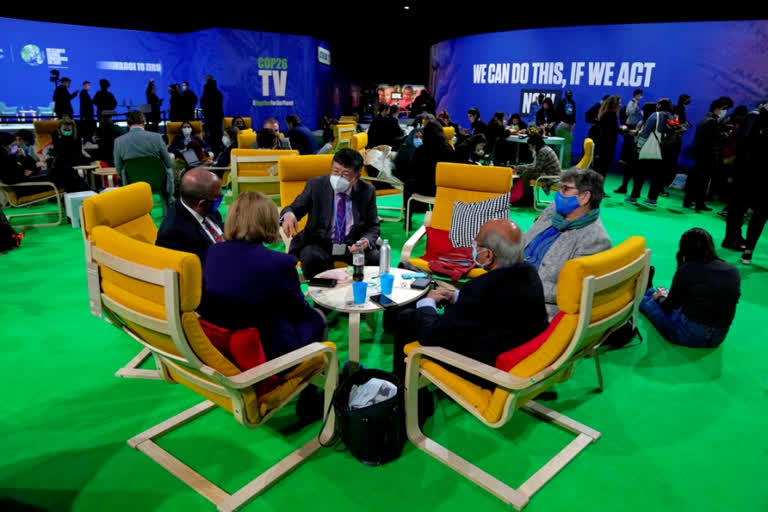Glasgow (Scotland): The world's top carbon polluters, China and the United States, agreed Wednesday to increase their cooperation and speed up action to rein in climate-damaging emissions, signalling a mutual effort on global warming at a time of tension over their other disputes.
In back-to-back news conferences at U.N. climate talks in Glasgow, Chinese climate envoy Xie Zhenhua and U.S. counterpart John Kerry said the two countries would work together to accelerate the emissions reductions required to meet the goals of the 2015 Paris Agreement on climate change.
"It's beneficial not only to our two countries but the world as a whole that two major powers in the world, China and the U.S., shoulder special international responsibilities and obligations," Xie told reporters. "We need to think big and be responsible."
"The steps we're taking ... can answer questions people have about the pace at which China is going, and help China and us to be able to accelerate our efforts," Kerry said.
China also agreed for the first time to crack down on methane leaks, following the lead of the Biden administration's efforts to curb the potent greenhouse gas. Beijing and Washington agreed to share technology to reduce emissions.
Governments agreed in Paris to jointly cut greenhouse gas emissions enough to keep the global temperature rise "well below" 2 degrees Celsius (3.6 degrees Fahrenheit) since pre-industrial times, with a more stringent target of trying to keep warming to 1.5 degrees Celsius (2.7 degrees Fahrenheit) preferred.
Also read:The magic 1.5: What's behind climate talks' key elusive goal
Both sides recognize that there is a gap between efforts taken globally to reduce climate pollution and the goals of the Paris deal, Xie said.
"So we will jointly strengthen climate action and cooperation with respect to our respective national situations," he said.
A U.S.-China bilateral agreement in 2014 gave a huge push to the creation of the historic Paris accord the following year, but that cooperation stopped with the Trump administration, which pulled the U.S. out of the pact. The Biden administration brought the U.S. back in to that deal, but has clashed with China on other issues such as cybersecurity, human rights and Chinese territorial claims.
"While this is not a gamechanger in the way the 2014 US-China climate deal was, in many ways it's just as much of a step forward given the geopolitical state of the relationship," said Thom Woodroofe, an expert in U.S.-China climate talks. "It means the intense level of US-China dialogue on climate can now begin to translate into cooperation."
The gesture of goodwill comes just days after President Joe Biden blamed Chinese President Xi Jinping's and Russian President Vladimir Putin's failure to attend talks in person for the lack of more progress in climate negotiations.
The U.S. and China will also revive a working group that will "meet regularly to address the climate crisis and advance the multilateral process, focusing on enhancing concrete actions in this decade," the declaration said.
Both Washington and Beijing intend to update the world on their new national targets for 2035 in 2025 — a move that is particularly significant for China. The declaration also said China will "make best efforts to accelerate" its plans to reduce coal consumption in the second half of this decade.
The announcement came as governments from around the world were negotiating in Glasgow about how to build on the Paris Agreement to reduce greenhouse gas emissions and protect vulnerable countries from the impacts of global warming.
Also read:Climate risks remain even if world limits warming to 1.5 deg C: UNEP report
